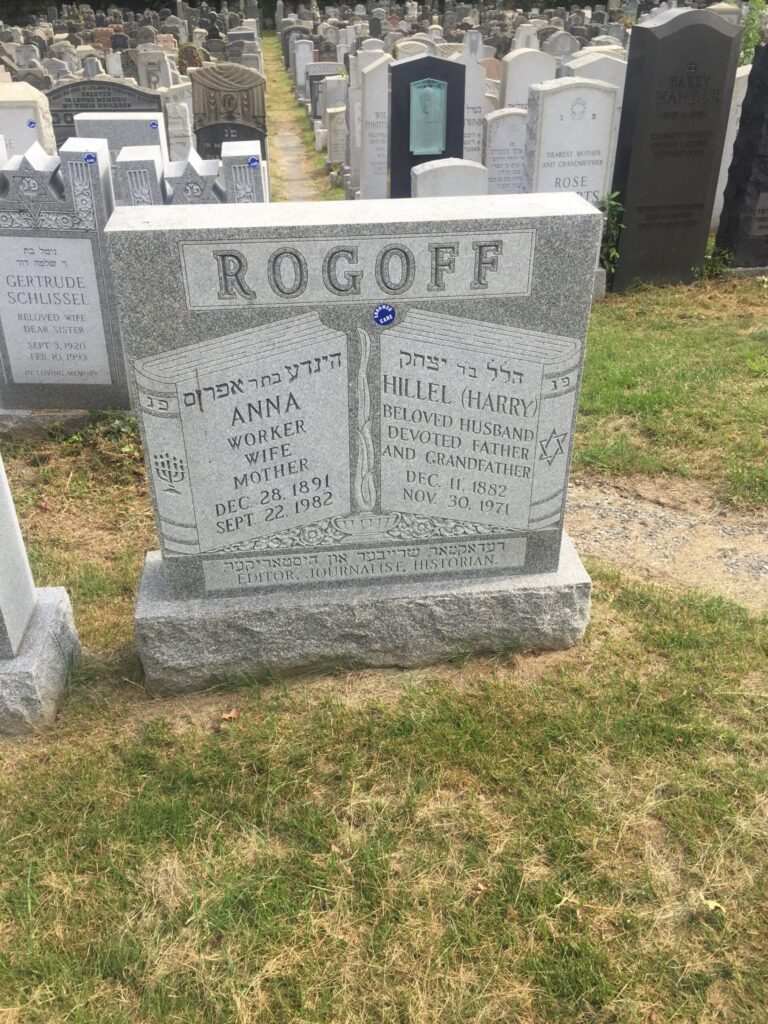Erik Visits an American Grave, Part 1,370
This is the grave of Harry Rogoff.

Born in Berezino, Russia (today, Belarus) in 1882, Hillel Rogoff and his parents immigrated to the U.S. in 1890, escaping the anti-Semitism and poverty endemic to that place and time. He was a real smart kid and managed to go to City College and graduated in 1906. He then became a major writer in Jewish America. One thing this series has helped teach me (that’s part of the reason for this series, I learn a ton and it really adds to my ability to teach and write) is the fecundity of Jewish literature in America at this time. It’s not that I didn’t fundamentally know this, but very, very little of it is read today.
Anyway, Rogoff (not sure when he started using “Harry” but it’s a classic Americanization move for an immigrant kid) attended the Rabbi Isaac Elchanan Theological Seminary, though I don’t think he became a rabbi. What he did do was have a very long career in journalism, writing in both English and Yiddish. To the extent he is really known today, it’s for his lengthy career working for The Forward, the nation’s preeminent Jewish newspaper. He was one of these do-it-all types. He wrote a ton of stuff on labor issues and other economic justice things. But he also wrote theater reviews. He could write about politics and art with equal fluidity. He also did a lot of travel writing in The Forward, including trips to Palestine, but also to Europe. He did leave briefly in 1908 to run a paper in Chicago called (in English anyway) The Jewish Workers World, but soon came back to New York and The Forward. As this suggests, he was deeply committed to the Jewish workers struggle and he did a lot of the journalism around the foundation of the Jewish garment workers unions and the rise of figures such as Sidney Hillman.
Rogoff was also committed to bringing Yiddish literature to English audiences and opened a literary magazine called East and West to translate this for English speakers. It didn’t do much, no, and folded after a couple of years, but still, the point was good enough. He also had his own forays into electoral politics, running as a Socialist Party candidate in a few New York state elections in the late teens and early twenties, though he never won. He married Anna Kovaler in 1916 and based on the grave, she obviously shared his politics, but I can’t find any real information about her. They did have a couple of kids.
Rogoff also wrote a bunch of books, including a Yiddish history of the U.S. in five volumes between 1925 and 1928. I am very interested in this, or at least in hearing more detail. He wrote a biography of Meyer London in Yiddish that he also translated into English. He translated other Jewish writers into English as well, including Morris Hillquit’s The History of the Socialist Movement in the United States. His commitment to socialism never wavered, but he was rightly skeptical of any meaningful labor party ever forming in the U.S., saying that the rest of the American labor movement was just too conservative for such politics. Thus, he moved toward New Deal-style legislation as the future as opposed to the Socialist Party by the 1930s.
In 1951, Rogoff replaced Abraham Cahan, who held the editor position until his death, as chief editor. He would work there for eleven more years, stepping away in 1964. He kept writing there though. Among his later works included anti-Vietnam War editorials, which was interesting because The Forward supported the Vietnam War by and large as it moved away from its leftist roots.
Rogoff died in 1971 at his home in New York. He was 88 years old.
Harry Rogoff is buried in Mount Carmel Cemetery, Queens, New York.
If you would like this series to visit other leading Jewish writers, you can donate to cover the required expenses here. Joseph Heller is in East Hampton, New York and Herman Wouk is in Elmont, New York. Previous posts in this series are archived here and here.


